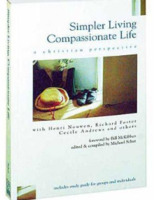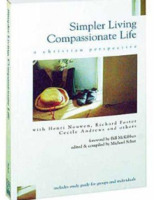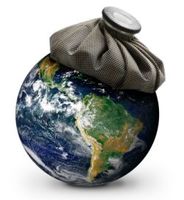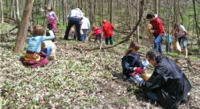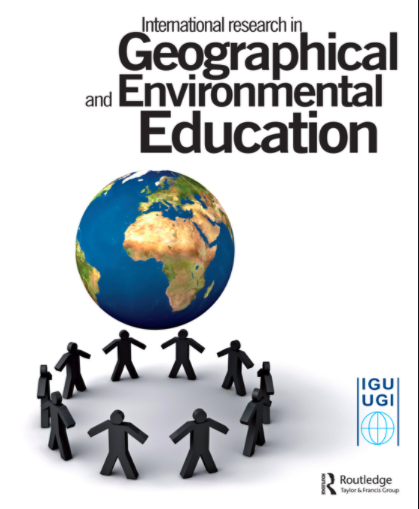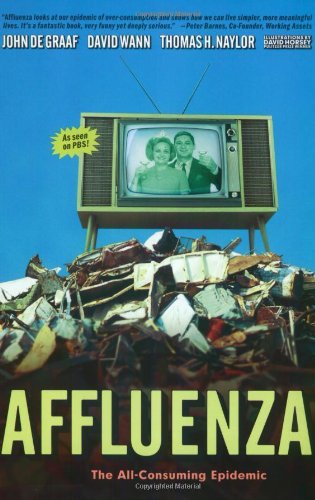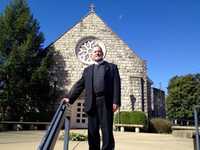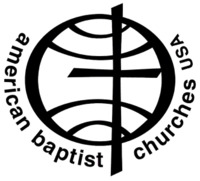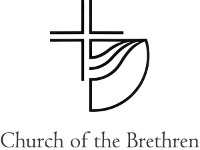Search
32 items
-
"Theology in Support of Simplicity and Eco-Justice" in Simpler Living, Compassionate Life
Simpler Living, Compassionate Life, is a book from Earth Ministries that consists of both essays and community guides regarding humanity’s relationship to our earthly home. This section, "Theology in Support of Simplicity and Eco-Justice," captures the Biblical and faith inspired foundation of the movement toward simplicity. It encourages those who are participants in a culture of over-consumption to reconsider their lifestyles and reverse the damage done to the gift that we have received. -
"Social Structures and the Politics of Simplicity" in Simpler Living, Compassionate Life
Simpler Living, Compassionate Life, is a book from Earth Ministries that consists of both essays and community guides regarding humanity’s relationship to our earthly home. This section, "Social Structures and the Politics of Simplicity," looks at systems in society that perpetuate and encourage over-consumption. From theology to capitalism to advertising, authors call out ways in which we have built our world for destruction. It focuses not only on personal choices, but the necessity of engaged politics and policy. For the full version Moriah Reichert's review of this section of the book, visit the link below. -
Evangelical Environmental Network: The Last Straw
Up to 12 billion tons of plastic trash end up in God’s oceans. Evangelical Environmental Network (EEN) maintains that trash is an affront to the glory of God. Trash eventually ends up someplace, and that someplace belongs to God. In order to put a stop to this waste, EEN has created The Last Straw Campaign Pledge. This pledge urges individuals to decline straws at restaurants and other food/beverage establishments, and avoid purchasing for home use. Additional steps of advocacy that one can take include asking local restaurants to only provide straws when customers request them and asking elected officials at the local and state levels to phase out the use of plastic straws, and single-use plastic. -
Season of Creation Week 1: A Culture of Relationships That Heals our Throwaway Culture
For each week of the Season of Creation, the World Council of Churches offers a resource for celebrating creation. The first week focuses on the throwaway culture that society has created and urges individuals to instead focus on just and sustainable practices. The document includes a call to prayer, a scripture reading, a hymn, and a responsive reflection. -
Columbus Catholic School becomes Designated GreenSpot School
The GreenSpot School designation indicates that a school has taken initiatives to educate their students and staff about sustainability, water issues, conserving energy, reducing waste, and green transportation. St. Mary School Catholic school has become the first in Columbus to earn this designation. They have implemented a recycling program, local garden, and composting, which qualified them to become a GreenSpot School. They have created a short video of students discussing their engagement and staff discussing the impact of becoming a GreenSpot School. -
The Necessity of Environmental Concern
A group of 20 Muslim youths worked to clean up an area in Columbus as a community service event. The event helped one Columbus-area Muslim leader realize that demonstrating concern for the environment is not a luxury, but a necessity. Many people prioritize a number of worldly things ahead of environmental care. Increasingly, faith groups are demonstrating that environmental concern and care needs urgent attention throughout the world. -
Giving Back to the Community on Earth Day 2016
This year on April 22 for Earth Day, many organizations are working in conjunction with Metro Parks Officials to clean up five parks within the Columbus area. Leaders hope to encourage involvement of congregations within local communities. A day of services can be a great teaching moment as well as an opportunity to give back. -
Earth Day statement from ELCA presiding bishop
The Reverend Elizabeth A. Eaton, Presiding Bishop of the Evangelical Lutheran Church in America (ELCA), issued an Earth Day statement on behalf of the ELCA. A salient excerpt from the statement is shown below:
"The effects of the warming climate are felt in nearly every corner of the globe. These include increased migration, food insecurity due to changing agricultural landscapes, national security issues and health problems. As bad as it is for all creation, the most vulnerable people around the world are suffering the most. Yet they have contributed the least and, as noted in the United Nation's 2030 Agenda for Sustainable Development,[iii] are ill equipped to adapt to or mitigate the effects of a changing climate to build resilient communities." -
Climate Change
The Presbyterian Church has put forth this video on care for creation, emphasizing that Christ has called us to go out into the world to care for creation and our fellow humans, especially the poor. The Union of Concerned Scientists has identified food, transportation, and energy as three key areas of focus to help stem climate change Congregations can help by implementing energy saving techniques, participate in recycling and composting waste, teaching children to grow food, and incorporating salient creation care concepts within educational settings. -
Hazardous Waste, Race, and the Environment
This statement was approved by the 207th General Assembly Presbyterian Church (U.S.A.), 1995. The predominant theme focuses on the impact that hazardous waste has on individuals who are suffering from poverty and minority groups. The final section provides suggestions for taking action. -
Climate Change
The World Council of Churches calls individuals to modify their consumer lifestyle for the greater good - to improve shared environmental conditions for all and with less negative impact among the poor. This excerpt provides a sense of urgency to act to reverse the threat of climate change:
"The urgency of the threat of climate change requires our generation to take immediate action and go beyond simple declarations and statements. New alternative models of life are called for. We challenge all people to move towards a style of life that derives its quality from the attentive enjoyment of nature and human relationships, from mutual care, dependence, trust and solidarity instead of the illusions of individual autonomy and material wealth, from spirituality and feelings of community, connectedness and intimacy instead of one-dimensional self-centredness. We draw strength from insights gained from the rich, community- oriented and simple lifestyles of indigenous and other marginalized communities. We are conscious of the significant contribution these communities, with their low carbon economies, deliver to the stabilization of the climate. We recommend the creation of 'just, participatory, sustainable and sustaining communities' for mutual support and call upon the churches and authorities to join them on this journey with reflection and practical support." -
Economic globalization and ecology
In this message, the World Council of Churches (WCC) focuses on how economic globalization affects the environment, with a specific focus on economic justice. The following excerpt provides a succinct summary of what WCC strives to achieve in this area:
"In this context of growing inequality, concentration of power, social exclusion and ecological destruction, people are longing for life with dignity in just and sustainable communities. If that goal is to be attained we need to work for equity as basic fairness that also extends to other life forms, respect for diversity as recognition of the complementary of, for example, cultures species, religious traditions, accountability as a way of being responsible towards one another and Earth itself, participation as the optimal inclusion of all involved, sufficiency as a commitment to meet the basic needs of all, and subsidiarity as determining the most appropriate level for decision-making, supporting the downwards distribution of power." -
How do we Communicate Environmental Ethics? Reflections on Environmental Education from a Kuwaiti Perspective
Dr. Khadija al-Naki, an educational researcher, discusses Islamic thought in relation to environmental education. Comparing Islamic teachings with Western environmental ethics, al-Naki opens a conversation on how to develop an environmental curriculum in Islamic education systems. This article leaves the reader questioning the role of education in the environmental movement.
Published in the journal International Research in Geographical and Environmental Education. -
Manifesto for an Ecological Reformation of Christianity
This Manifesto by the World Council of Churches is a call to examine Christian practices that may be harmful to the Earth, humans, and other species. It urges individuals instead to focus on what various “eco-congregations” or “green churches” are doing. The following manifesto excerpt provides a rationale for the need for ecological reformation:
"The need for an ecological reformation of all Christian traditions is of course manifested in different ways in various parts of the world. The pain impulses associated with ecological destruction have been registered especially in those areas that lie on the periphery of current constellations of economic power. The call for an ecological reformation of Christianity has come with particular urgency from Christians in such areas (the Pacific, Africa, Asia, Latin-America) as they are more exposed and vulnerable. This call is echoed by churches which belong to (mainly protestant) countries in the global North which have contributed heavily to the exploitation of natural resources, industrial production and a style of consumption that causes environmental degradation." -
Affluenza Documentary (1997)
A one-hour PBS documentary which analogizes materialism and consumption to an epidemic. The term 'affluenza' is a combination of 'affluence' and 'influenza.' This an educational and socially critical piece that discusses the harmful affects of overconsumption, and provides ways to 'treat' it. -
Resources for Affluenza
This is a PBS website dedicated to providing information and resources on overconsumption. It also provides a quiz to asses your consumption quotient, and tips for reducing consumptive behaviors. Lastly, this website has a Teacher's Guide for grades 5-12. This was created in relation to the PBS documentary, Affluenza. -
Wanted: Innovative Farmers to Help Slow Algal Bloom on Lake Erie
The Christian Science Monitor has written an article discussing how agricultural nutrients in the Maumee River, Lake Erie’s biggest source of pollution, are reaching record proportions. Most nutrient pollution is caused by large storms, and with climate change, these storms are becoming increasingly more common. The USDA reports that farmers are making headway toward reducing nutrient pollution on a voluntary basis, but many researchers say that these efforts are not sufficient. A recent report suggests additional outreach, an increased focus of conservation dollars, and mandated soil testing.
Wetland restoration – bringing back bits of the Black Swamp— can play a pivotal role in clearing algal bloom in Lake Erie. The Black Swamp Conservancy is currently working on turning 60 acres back into swamp in northwestern Ohio. William Mitsch, a retired Ohio State University professor and wetlands expert, hopes to eventually restore a tenth of the Black Swamp (about 100,000 acres) to provide a substantial cleaning of Lake Erie. -
Sustainable Weddings in Columbus
Weddings are typically large events to celebrate the union of two people. Regardless of how beautiful the celebration is, weddings can still generate a lot of waste. In fact, the average wedding can generate 500 pounds of trash. Recently, there has been a movement to have local sustainable weddings that cut environmental impacts significantly. -
Laudato Si’ in Columbus: Bishop Campbell Regales OSU Students with Historical Overview of Catholic Tradition
Bishop Campbell spoke to OSU students about Laudato Si', specifically regarding how Catholic tradition develops the context for it.
"Bishop Campbell highlighted four themes in his talk, including how Catholicism has considered nature for 2,000 years, a Catholic imagination of nature, historical trends of alienation from nature in the Western world, and a discussion of how sin – light and shadow of the world together – plays a role in our ecological situation."
Please click on the link below to view the entire article. -
Anamchara Faith Community Celebrates Earth Day 2016
This year, the Anamchara Faith Community will be providing an Earth Day celebration in the woods at Bernheim Forest in Bullitt County, Kentucky. The service will include biblical passages that give honor to the importance of trees, with the plan to plant at least one during this time. This service will draw from different faiths and cultures, ranging from the Catholic faith to Native American customs and traditions. -
Trees for the Earth
The Catholic community is joining with the Earth Day Network to help reach the goal of planting 7.8 billion trees by 2020. This would equate to one tree per person on earth. Pope Francis's recent encyclical, Laudato Si, focuses on the importance of trees and their benefits to the environment as well as human kind. -
Tu B’Shvat: Trees’ ReBirth Day
The Jewish festival of Tu B’Shvat, also known as the New Year for Trees, celebrates the ReBirthDay of earthly trees and of the sacred and supernal Tree of Life. The celebration begins on January 30th and ends January 31st. It is celebrated with a Seder in which the menu is the fruits and nuts that are given by the trees. As a special aspect of their climate-crisis work, The Shalom Center is inviting people to create a special Trees of Life Fund for reforestation in the US. -
Environmental Statement – American Baptist Churches
Environmental problems that exists today have stemmed from humanity’s current and past greed. Science and technology are being abused and threaten to make problems worse, even though they have the power to make things better. American Baptists advocate that we must be stewards of our home and not abuse it if we wish to continue on as a species. In order to fix what humans have caused, we are called to recognize and preserve the earth and natural resources we have. -
Environmental Statement – Church of the Brethren
The Bible is filled with examples that demonstrate our responsibility to care for all creation on our planet. From Genesis to the parables of Jesus, it is explicitly stated that we must be caring stewards of the earth. In order to reverse the damage that humankind has done, the Church of the Brethren is calling its own members and all people to action. In addition, they are also calling upon the government to be more supportive of environmental policies and clean up. -
Environmental Statement – Reformed Church in America
In 1982, the Christian Action Commission of the Reformed Church in America (RCA) released a document titled “Care for the Earth: Theology and Practice.” This was given to General Synod, who then passed several resolutions outlining the Reformed Church in America’s stance on environmental issues. The Action Institute wrote the article below that discusses the resolutions that were passed.

